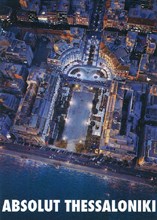It is in the nature of copywriters, designers and art directors to strive towards the noble cause of creating advertisements that change the world. Some adverts make you laugh. Some adverts make you cry. Some are memorable, and others are fleeting, past the sell-by date of their significance and conspicuous impact. Some are intriguing, enchanting, endearing, whilst others still are subversive, divisive, engendering shock, protest and even calls for censorship and repeal.
But there are some adverts which have truly achieved what all advertising creatives set out to achieve, and what all nay-sayers of the advertising game cynically accuse advertising of committing: ingraining the message, the presence and the spirit of the brands they represent into the very psyche of their audience, and, by so doing, defining the social and cultural tone of its generation, as well as of numerous generations to come.

Think back to Apple's iconic "1984" Macintosh commercial, directed by none other than Ridley Scott, which compared its contemporaries, and the world of commercial computer products at large, to the dull, dreary, uninspired, and soulless collectivist dystopia envisioned by George Orwell in his equally iconic novel of the same title, from which this advert took its inspiration. Recall any one of the myriad manifestations of Absolut's iconographic vodka bottle, taking centre stage in what is considered to be the world's longest-running ad campaign (it kicked off in 1981 and has been haunting us with the Absolut-ism of its shapely visage ever since).

And, last but certainly not least, what article on iconic copywriting could fail to mention that singularly momentous piece of copy, that seemingly humble and unassuming strap line consisting of four little words, which went on to achieve what can only be described as "cult status", inspiring droves of literary works, films and songs - and catapulting the brand awareness gravity of DeBeers, besides - "A Diamond is Forever". Crafted by a young, ambitious and fastidiously hardworking copywriter back in 1948, who worked into the late hours of the night, cloistered within the offices of N.W. Ayer & Son, this piece of iconic copy has been indelibly ingrained into the psyche of audiences spanning across two centuries, its longevity and endurance far surpassing the fame and association of the very advert it was created to serve, to the point of being a well-worn cliché.
If the phrase "inspirational copy" is to have any veritable substance, then this is what it refers to, as a standard of measurement, and as an ideal.
Imbue your advertising with brand messaging strategies powered by inspirational copy. Contact Wetpaint Advertising for more information on how to make your ads iconic!